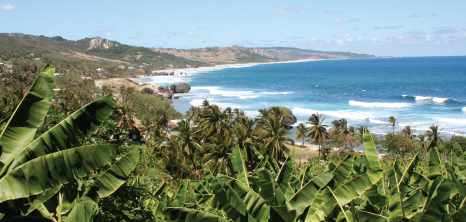|
Democratic Labour PartyOn the night of 27th April, 1955, twenty-six persons met at "Glenhurst", Lands End, St. Michael, Barbados. They represented varied backgrounds and outlooks. Some had already had considerable experience in Politics, because four of them were then members of the House of Assembly, and two of them had sat in that Chamber some years before. By the time the meeting ended, twenty-five people had started something that would change the course of Barbadian history.
Thus was the Democratic Labour Party born. At the "Glenhurst" meeting, the Constitution of the Party, which was to come into force on 1st May, 1955, was adopted by the following foundation members who formed the first Provisional General Council of the Party:
The period between the formation of the D.L.P. in 1955 and the formation of the first D.L.P. Government in 1961 was a simple story of initial defeat and discouragement turned into victory through perseverance and hard work. In the 1956 General Election only four of the D.L.P's sixteen candidates were successful. In the time following Mr. (later Sir) Theodore Brancker served as the Leader of the Opposition and Mr. C. F. Broome was the Party Chairman.
Subsequent to the death of Mr. Charlie Broome in 1959, Mr. Errol Barrow was elected Chairman and in this capacity led the Party into the momentous General Election of 1961. On December 5th 1961 the Democratic Labour Party won 14 of the 24 seats in the Barbados House of Assembly.
DLP Terms Of Government1961 - 1966 Errol W. Barrow (Premier) 1966 - 1971 Errol W. Barrow (Prime Minister) 1971 - 1976 Errol W. Barrow (Prime Minister) 1986 - 1991 Errol W. Barrow/Erskine Sandiford (Prime Minister) 1991 - 1994 Erskine Sandiford (Prime Minister)
The DLP as a GovernmentThree days after its victory on December 5th 1961, Errol Barrow who was appointed Premier and Minister of Finance, announced his first cabinet. "Operation Takeover" the Party's campaign slogan had taken effect.
The 1961 Cabinet was as follows:
Hon. E. W. Barrow - Premier and Minister of Finance
The 1961 Election Manifesto of the Democratic Labour Party looked forward to Independence for Barbados, but first Barrow and his cabinet set about changing the social and economic landscape of Barbados.
Over the next 15 years, the first term of office for the DLP, Barbados moved from "a village to a Nation".
These are some of the hallmarks of our first term in office, 1961 -1976:
ManufacturingThe Democratic Labour Party was responsible for moving the Barbadian economy from total dependence on sugar-based agriculture, to a more balanced economy, with the development of the Tourism and Manufacturing sectors.
By 1976 15,000 Barbadian men and women, were gainfully employed in Manufacturing. Industrial Estates and Parks were opened at Grazettes, the Harbour, Wildey, Newton, Seawell and Six Cross Roads.
This industrialization shift opened the floodgates for employment for women, young and old. The effects of these policies are still being felt today.
TourismThe Democratic Labour Party can rightfully claim that it was responsible for putting Barbados on the world map. As part of its strategy to broaden the economic base though Tourism, the Board of Tourism spearheaded a drive to market Barbados in the major markets. Offices were opened in New York, London, and Toronto.
Overseas sales tours were inaugurated in 1964, with representatives from the hotel sector, taxi and tour operators and popular local entertainers of the day. Barbados Tourism was on the way.
The Hotel School was established in 1963 to train Barbadians to meet the demand of a growing service industry and the government led the way by constructing the largest hotel on the island at the time, the HILTON.
Other businesses serving tourism sprang up; restaurants, nightclubs, water sports, car hire companies. Tens of thousands of jobs were created.
HealthThe health of our people has always been a priority for the Democratic Labour Party. On assuming office in 1961, the DLP Government determined that a sound health public health system was the most economic and effective way of dealing with many health problems facing the country.
Primary health care was delivered to the people of Barbados through an integrated system of public and private facilities. Barbadians had access to all facilities provided by the State, FREE OF COST. The QEH was converted from a village hospital into a modern teaching Hospital and a referral centre for the Eastern Caribbean.
Secondary and Tertiary healthcare was delivered through Polyclinics and Geriatric hospitals, set up throughout the island to meet the needs of our people.
A modern face was put on healthcare in Barbados by the Democratic Labour Party.
AgricultureThe foundations of modern Agriculture as distinct from the straightforward cultivation of sugar were formed in Barbados following the enunciation in 1961 of the first Diversification Policy for the country.
The following are the strategy highlights upon which modern agriculture was built:
Some Development Initiatives were:
Other Major Accomplishments of the DLP
The above list is not exhaustive. There are many other pieces of legislation, buildings, roads and other infrastructure developed under the DLP. What gives the greatest satisfaction, however, is the impact it has had on the lives of ordinary Barbadians.
It is often said that the DLP created the "middle class" in Barbados. We are proud of our record. We are proud to have made life better for all Barbadians and will continue to work for a Brighter Future for ALL.
Further information on the Democratic Labour Party can be sourced at the following website http://www.dlpbarbados.org/cms/index.php or via telephone: (246) 429-3104 or Email: dlp@caribsurf.com.
|
||||||||||||||||||||||||||||||||||||||||||||||||||||||||||||||||||||||||||||||||||||||||||||||||||||||||||||||||||||||||||||||||||||||||||||||||||||||



